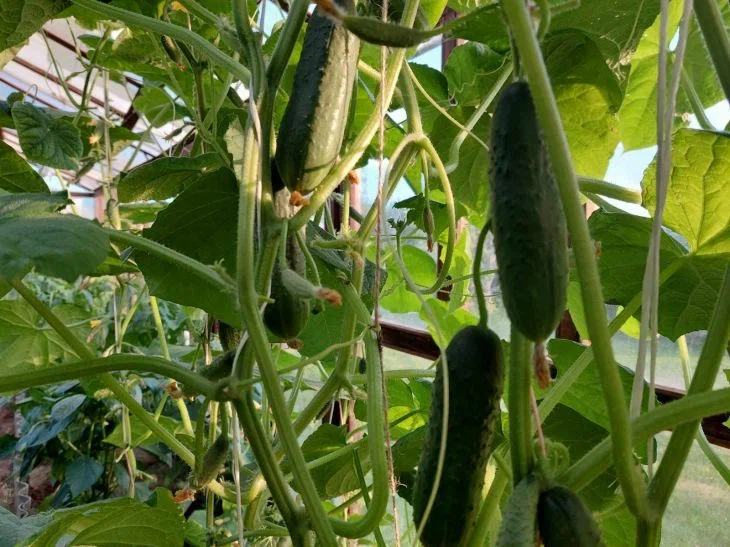In July, cucumbers actively bear fruit, so the plants require special attention and additional nutrition.
In order to get a bountiful harvest and large, juicy fruits, it is important to know what and how to feed cucumbers during this period.
Experienced gardeners know that proper plant nutrition is the key to their health and high yields.
Nitrogen fertilizers: growth stimulation
Nitrogen plays an important role in the growth and development of cucumbers. Especially during fruiting, this element helps to form green mass, which provides the plant with the necessary nutrients for full development and a rich harvest.
A good choice for feeding can be ammonium nitrate or urea. These fertilizers are easily dissolved in water and are quickly absorbed by plants.

Potassium fertilizers: improving the taste and quality of fruits
Potassium plays a key role in fruit formation and taste. It helps increase the sugar content in fruits, making them sweeter and juicier.
For potassium fertilizing, you can use potassium sulfate or wood ash.
In addition, these fertilizers help strengthen the immunity of plants, which increases their resistance to diseases and pests.
Phosphorus fertilizers: support for the root system
Phosphorus is necessary for the development of the root system and the improvement of metabolic processes in the plant.
During the fruiting period, cucumbers need phosphorus to ensure stable growth and development of fruits. Superphosphate is an excellent phosphorus fertilizer that can be applied both dry and as a solution. This fertilizer helps strengthen the roots and increase yields.
Organic fertilizers: natural growth stimulants
Organic fertilizers are an excellent option for feeding cucumbers during the fruiting period. They not only provide the plants with the necessary nutrients, but also improve the soil structure.
A good choice may be compost, humus or mullein infusion. These natural growth stimulants help to increase the yield and improve the quality of fruits without the risk of oversaturating the soil with chemical elements.
Microelements: balance and harmonious development
For full growth and fruiting, cucumbers need not only macronutrients, but also micronutrients. Iron, magnesium, boron, and zinc play an important role in metabolic processes and maintaining plant health.
To provide cucumbers with microelements, you can use special complex fertilizers or microelement solutions. These supplements will help to avoid microelement deficiency and improve the overall condition of the plants.
Watering and mulching: maintaining optimal humidity
Regular watering is one of the main conditions for successful fruiting of cucumbers. It is important to keep the soil moist, but not oversaturated with water, to avoid root rot.
Watering should be regular and abundant, especially on hot days. Mulching will help retain moisture in the soil and prevent it from drying out. Straw, mown grass or compost can be used as mulch.
Use of folk remedies: safe and effective methods
Folk remedies can also be useful for feeding cucumbers. Nettle infusion, for example, is rich in nitrogen and microelements, which makes it an excellent natural fertilizer.
Ash from burning wood contains potassium and phosphorus, which are necessary for fruiting. Using such means allows you to avoid chemical additives and maintain the health of plants in a natural way.
Earlier we talked about why you should hammer rusty nails into fruit trees.








